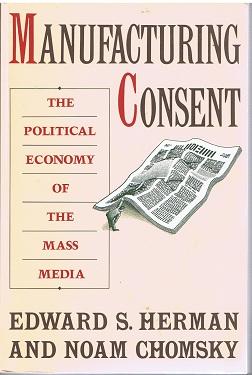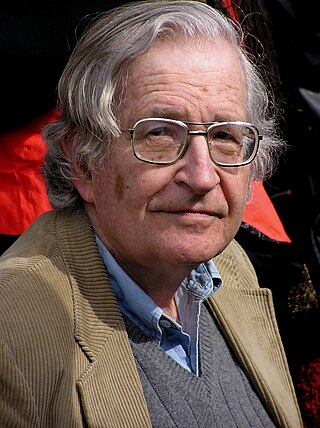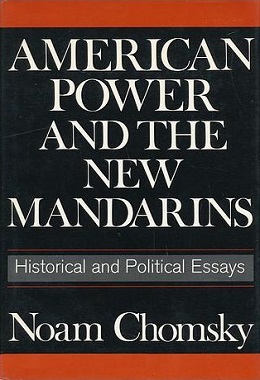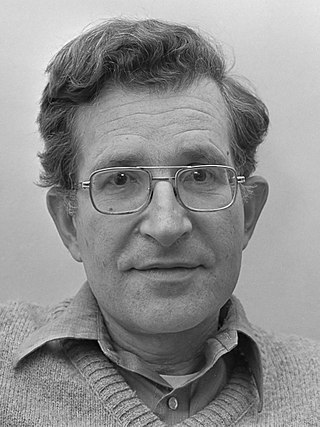Related Research Articles

Manufacturing Consent: The Political Economy of the Mass Media is a 1988 book by Edward S. Herman and Noam Chomsky. It argues that the mass communication media of the U.S. "are effective and powerful ideological institutions that carry out a system-supportive propaganda function, by reliance on market forces, internalized assumptions, and self-censorship, and without overt coercion", by means of the propaganda model of communication. The title refers to consent of the governed, and derives from the phrase "the manufacture of consent" used by Walter Lippmann in Public Opinion (1922). The book was honored with the Orwell Award.

Avram Noam Chomsky is an American professor and public intellectual known for his work in linguistics, political activism, and social criticism. Sometimes called "the father of modern linguistics", Chomsky is also a major figure in analytic philosophy and one of the founders of the field of cognitive science. He is a laureate professor of linguistics at the University of Arizona and an institute professor emeritus at the Massachusetts Institute of Technology (MIT). Among the most cited living authors, Chomsky has written more than 150 books on topics such as linguistics, war, and politics. Ideologically, he aligns with anarcho-syndicalism and libertarian socialism.
The Faurisson affair was an academic controversy following publication of a book, Mémoire en défense (1980), by French professor Robert Faurisson, a Holocaust denier, and the inclusion of an essay by American linguist Noam Chomsky, entitled "Some Elementary Comments on the Rights of Freedom of Expression", as an introduction to Faurisson's book.

Hegemony or Survival: America's Quest for Global Dominance is a book about the United States and its foreign policy written by American political activist and linguist Noam Chomsky. It was first published in the United States in November 2003 by Metropolitan Books and then in the United Kingdom by Penguin Books. It was republished by Haymarket Books in January 2024.
Edward Samuel Herman was an American economist, media scholar and social critic. Herman is known for his media criticism, in particular the propaganda model hypothesis he developed with Noam Chomsky, a frequent co-writer. He held an appointment as Professor Emeritus of finance at the Wharton School of Business of the University of Pennsylvania. He also taught at Annenberg School for Communication at the University of Pennsylvania.

Bernard B. Fall was a prominent war correspondent, historian, political scientist, and expert on Indochina during the 1950s and 1960s. Born in Austria, he moved with his family to France as a child after the Anschluss. He started fighting for the French Resistance at the age of 16 and later for the French Army during World War II.
Dwight Macdonald was an American writer, critic, philosopher, and activist. Macdonald was a member of the New York Intellectuals and editor of their leftist magazine Partisan Review for six years. He also contributed to other New York publications including Time, The New Yorker, The New York Review of Books, and Politics, a journal which he founded in 1944.

Noam Chomsky is an intellectual, political activist, and critic of the foreign policy of the United States and other governments. Noam Chomsky describes himself as an anarcho-syndicalist and libertarian socialist, and is considered to be a key intellectual figure within the left wing of politics of the United States.

"Objectivity and Liberal Scholarship" is an essay by the American academic Noam Chomsky. It was first published as part of Chomsky's American Power and the New Mandarins. Parts of the essay were delivered as a lecture at New York University in March 1968, as part of Albert Schweitzer Lecture Series. The first third of the essay, "The Menace of Liberal Scholarship" by Noam Chomsky in The New York Review of Books, January 2, 1969, was taken "almost verbatim" from this essay.

American Power and the New Mandarins is a book by American academic Noam Chomsky. Largely written in 1968 and published in 1969, it was his first text focused on politics and sets out in detail his opposition to U.S. involvement in the Vietnam War.
Intellectual responsibility is a philosophical concept related to that of epistemic justification. According to Frederick F. Schmitt, "the conception of justified belief as epistemically responsible belief has been endorsed by a number of philosophers, including Roderick Chisholm (1977), Hilary Kornblith (1983), and Lorraine Code (1983)."
Counter-Revolutionary Violence: Bloodbaths in Fact & Propaganda is a 1973 book by Noam Chomsky and Edward S. Herman, with a preface by Richard A. Falk. It presented the thesis that the "United States, in attempting to suppress revolutionary movements in underdeveloped countries, had become the leading source of violence against native people".
Politics, stylized as politics, was a journal founded and edited by Dwight Macdonald from 1944 to 1949.
This is a list of writings published by the American author Noam Chomsky.
Mitchell Goodman was an American writer, teacher, and activist. He is best known for his role in the Vietnam draft resistance movement, which drew the high-profile 1968 federal prosecution of the "Boston Five."

Occupy is a short study of the Occupy movement written by the American academic and political activist Noam Chomsky. Initially published in the United States by the Zuccotti Park Press as the first title in their Occupied Media Pamphlet Series in 2012, it was subsequently republished in the United Kingdom by Penguin Books later that year.

Cambodian genocide denial is the belief expressed by some Western academics that early claims of atrocities committed by the Khmer Rouge government (1975–1979) in Cambodia were much exaggerated. Many scholars of Cambodia and intellectuals opposed to the US involvement in the Vietnam War denied or minimized reports of human rights abuses of the Khmer Rouge, characterizing contrary reports as "tales told by refugees" and US propaganda. They viewed the assumption of power by the Communist Party of Kampuchea as a positive development for the people of Cambodia who had been severely impacted by the Vietnam War and the Cambodian Civil War. On the other side of the argument, anti-communists in the United States and elsewhere saw in the rule of the Khmer Rouge vindication of their belief that the victory of Communist governments in Southeast Asia would lead to a "bloodbath."
RESIST is a philanthropic non-profit organization based out of Boston, Massachusetts. It has provided grants to grassroots activist organizations around the country since its inception in 1967 as a result of the anti-war proclamation "A Call to Resist Illegitimate Authority".

The Chomsky–Foucault debate was a debate about human nature, between Noam Chomsky and Michel Foucault at the Eindhoven University of Technology in the Netherlands, on 22 October 1971 at 7:30 p.m. The debate was broadcast on 28 November 1971 at 9:30 p.m. Chomsky and Foucault were invited by the Dutch philosopher Fons Elders to discuss an age-old question: "is there such a thing as 'innate' human nature independent of our experiences and external influences?"

Decoding Chomsky: Science and Revolutionary Politics is a 2016 book by the anthropologist Chris Knight on Noam Chomsky's approach to politics and science. Knight admires Chomsky's politics, but argues that his linguistic theories were influenced in damaging ways by his immersion since the early 1950s in an intellectual culture heavily dominated by US military priorities, an immersion deepened when he secured employment in a Pentagon-funded electronics laboratory in the Massachusetts Institute of Technology.
References
- ↑ Chomsky, Noam (23 February 1967). "The Responsibility of Intellectuals". The New York Review of Books . 8 (3). Archived from the original on 2010-04-08. Retrieved 2009-09-03.
- ↑ Chomsky, Noam (23 February 1967). "The Responsibility of Intellectuals". The New York Review of Books. Archived from the original on 15 November 2023. Retrieved 6 November 2023.
- 1 2 3 Jacoby, Russell (1989). "The Responsibility of Intellectuals?". Grand Street. 8 (4): 185–195. doi:10.2307/25007282. ISSN 0734-5496. JSTOR 25007282. Archived from the original on 2022-08-28. Retrieved 2024-05-16.
- ↑ "Noam Chomsky's 'The Responsibility of Intellectuals', 50 Years On - Video of Conference at University College London". Archived from the original on 2024-04-16. Retrieved 2024-05-16.
- ↑ Allott, Nick; Knight, Chris; Smith, Neil (2019). The Responsibility of Intellectuals - Reflections by Noam Chomsky and Others after 50 years (PDF). London: UCL Press. ISBN 9781787355514. Archived (PDF) from the original on 2019-09-05. Retrieved 2024-05-16.
- ↑ Mike Cushman, ‘UCL attack on Academic Freedom’ Archived 2024-04-28 at the Wayback Machine , Free Speech on Israel; Matthew Reisz, Times Higher Education Supplement, 24 October 2019 Archived 28 April 2024 at the Wayback Machine .